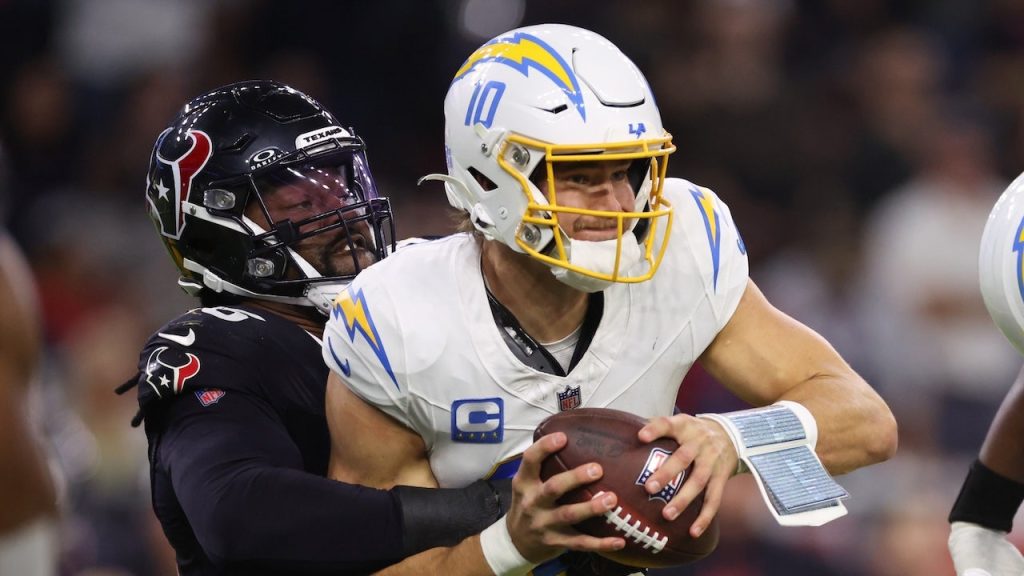The Los Angeles Chargers’ playoff hopes were dashed in a disheartening 32-12 loss to the Houston Texans on Saturday, a game marked by a historically poor performance from star quarterback Justin Herbert. Herbert, who had thrown a mere three interceptions during the entire regular season, joining the elite company of Tom Brady and Aaron Rodgers in that achievement, uncharacteristically threw four interceptions against the Texans. This dismal showing, coupled with just 14 completions on 32 attempts, arguably marked the worst game of his professional career, further solidifying a concerning 0-2 playoff record. The weight of the defeat was compounded by the memory of the Chargers’ previous playoff collapse against the Jacksonville Jaguars in the 2022 wild-card round, a game that also saw Herbert struggle under pressure. The online reaction was swift and unforgiving, with Herbert bearing the brunt of intense criticism across social media platforms.
The game itself was not solely defined by Herbert’s struggles. It also bore witness to a unique moment in NFL playoff history, etched into the record books by Texans defensive back D’Angelo Ross. Following a blocked extra point attempt by Chargers kicker Cameron Dicker after an 86-yard touchdown reception by Ladd McConkey, Ross seized the deflected ball and returned it for two points, marking the first such play in NFL postseason history. This unusual score extended Houston’s lead to 25-12, further solidifying their dominance in the game. The rule allowing two points for a returned blocked extra point was implemented in 2015, replacing the previous dead-ball scenario. While not a common occurrence, Ross’s play represented the ninth such instance since the rule change, with the most recent regular season example occurring in a game between the Eagles and Buccaneers in September 2024.
The loss extends the Chargers’ playoff drought to six consecutive seasons, a painful statistic for a franchise boasting a talented roster. Their last playoff victory dates back to 2018, a wild-card triumph over the Baltimore Ravens during Philip Rivers’ final postseason run with the team. The weight of expectation and the pressure to deliver in the playoffs continue to haunt the Chargers, raising questions about their ability to translate regular season success into postseason glory. The recurring theme of playoff disappointments casts a shadow over the team’s future and underscores the need for significant changes, both in terms of performance and mentality.
For the Houston Texans, the victory represents a second consecutive year with a playoff win, a testament to the burgeoning leadership of quarterback C.J. Stroud and head coach DeMeco Ryans. Their success marks a resurgence for the franchise and signals a promising future built on a strong foundation of young talent and effective coaching. The win against the Chargers serves as a significant milestone in their rebuilding process, demonstrating their ability to compete with and defeat established playoff contenders. The Texans’ continued success will undoubtedly hinge on the further development of Stroud and the strategic guidance of Ryans, a combination that has proven effective in navigating the challenges of the NFL.
Justin Herbert’s disastrous performance against the Texans will undoubtedly be a focal point of analysis and discussion in the coming weeks and months. His inability to replicate his regular season success in the playoffs raises concerns about his ability to perform under pressure and manage the heightened stakes of postseason football. The contrast between his regular season efficiency and playoff struggles presents a perplexing puzzle for the Chargers coaching staff, who must identify and address the underlying factors contributing to this disparity. Whether it be a matter of game planning, mental fortitude, or simply the increased intensity of playoff competition, Herbert’s future success hinges on his ability to overcome these challenges and deliver consistent performances in crucial moments.
The Chargers’ continued playoff futility and Herbert’s struggles underscore the inherent unpredictability of the NFL postseason. While regular season performance provides a valuable indicator of a team’s potential, playoff success often hinges on a complex interplay of factors, including coaching, execution, and the ability to perform under pressure. The Chargers’ recent history serves as a cautionary tale, highlighting the importance of not only building a talented roster but also cultivating a winning culture and developing the mental resilience necessary to thrive in the high-stakes environment of the playoffs. The road ahead for the Chargers is paved with challenges, and their ability to overcome these obstacles will determine their future success in the pursuit of a elusive Super Bowl title.


